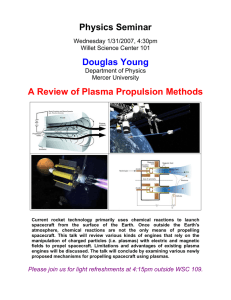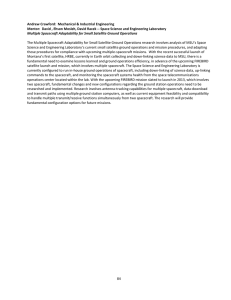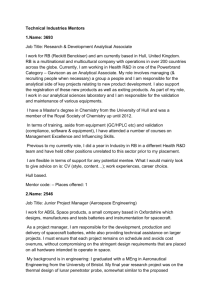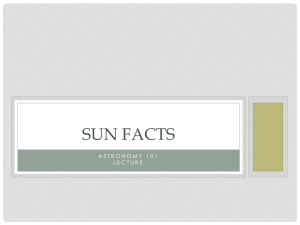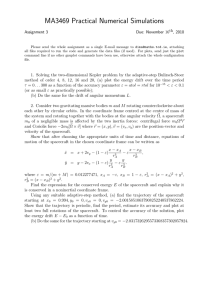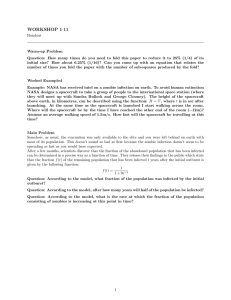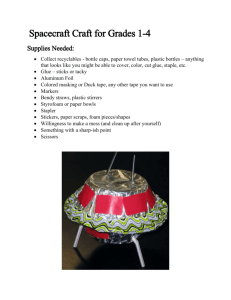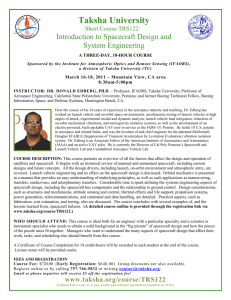Department of Electrical Engineering
advertisement
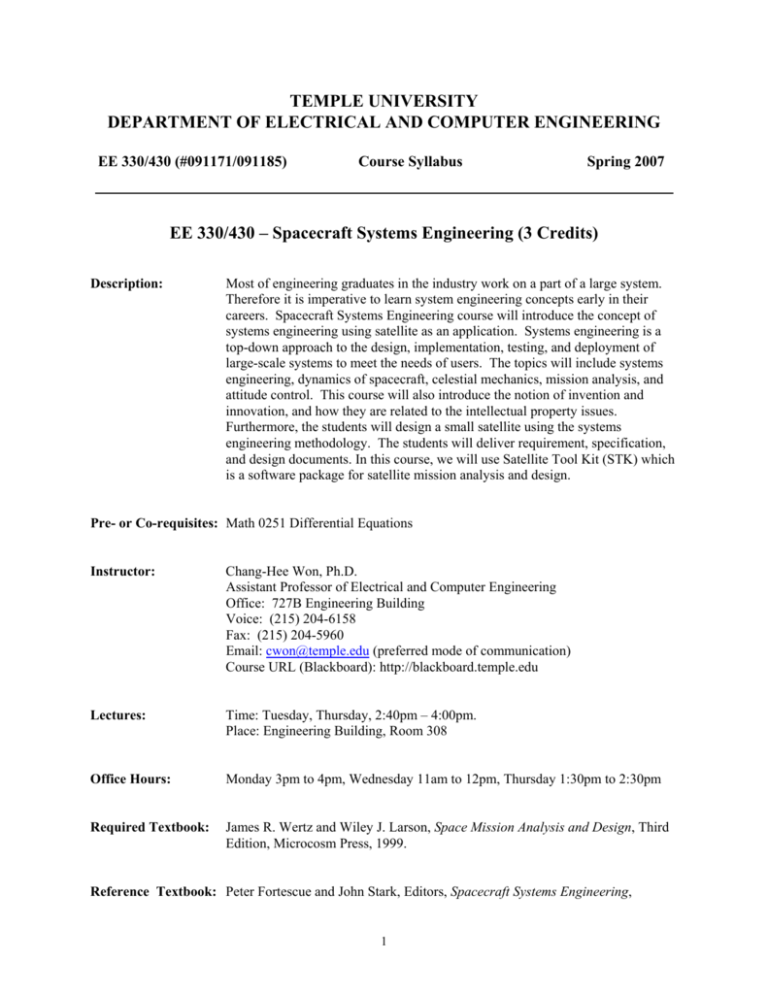
TEMPLE UNIVERSITY DEPARTMENT OF ELECTRICAL AND COMPUTER ENGINEERING EE 330/430 (#091171/091185) Course Syllabus Spring 2007 EE 330/430 – Spacecraft Systems Engineering (3 Credits) Description: Most of engineering graduates in the industry work on a part of a large system. Therefore it is imperative to learn system engineering concepts early in their careers. Spacecraft Systems Engineering course will introduce the concept of systems engineering using satellite as an application. Systems engineering is a top-down approach to the design, implementation, testing, and deployment of large-scale systems to meet the needs of users. The topics will include systems engineering, dynamics of spacecraft, celestial mechanics, mission analysis, and attitude control. This course will also introduce the notion of invention and innovation, and how they are related to the intellectual property issues. Furthermore, the students will design a small satellite using the systems engineering methodology. The students will deliver requirement, specification, and design documents. In this course, we will use Satellite Tool Kit (STK) which is a software package for satellite mission analysis and design. Pre- or Co-requisites: Math 0251 Differential Equations Instructor: Chang-Hee Won, Ph.D. Assistant Professor of Electrical and Computer Engineering Office: 727B Engineering Building Voice: (215) 204-6158 Fax: (215) 204-5960 Email: cwon@temple.edu (preferred mode of communication) Course URL (Blackboard): http://blackboard.temple.edu Lectures: Time: Tuesday, Thursday, 2:40pm – 4:00pm. Place: Engineering Building, Room 308 Office Hours: Monday 3pm to 4pm, Wednesday 11am to 12pm, Thursday 1:30pm to 2:30pm Required Textbook: James R. Wertz and Wiley J. Larson, Space Mission Analysis and Design, Third Edition, Microcosm Press, 1999. Reference Textbook: Peter Fortescue and John Stark, Editors, Spacecraft Systems Engineering, 1 Second Edition, John Wiley, 1995. Student and Faculty Academic Rights and Responsibilities Policy: Freedom to teach and freedom to learn are inseparable facets of academic freedom. The University has a policy on Student and Faculty and Academic Rights and Responsibilities (Policy #03.70.02) which can be accessed through the following link: http://policies.temple.edu/getdoc.asp?policy_no=03.70.02. Special Considerations: Any student who has a need for accommodation based on the impact of a disability should contact me privately to discuss the specific situation as soon as possible. Contact Disability Resources and Services at 215-204-1280 in 100 Ritter Annex to coordinate reasonable accommodations for students with documented disabilities. Topics and Reading Assignment: 1. 2. 3. 4. 5. 6. 7. Topics First Reference Book Reading Assignment Introduction The Spacecraft Environment and Its Effect on Design Spacecraft Systems Engineering Introduction to Astrodynamics Spacecraft Subsystems Ground Stations Invention, Intellectual Property Rights, and Entrepreneurship Ch. 1 Ch. 2 Ch. 19 Ch. 10 Text Book Reading Assignment Ch. 8 Ch. 1, 2, 3, and 4 Ch. 6 Ch. 11 Ch. 15 Course Grading Policy: The relative weight of the different types of work used to assess individual performance in the course is provided in the following table: Quizzes Homework Documentations Presentations 30% 20% 30% 20% There will be a number of quizzes in the course. The quizzes may be announced or unannounced. Students are encouraged to participate in class discussions. Part of the quiz grade may be substituted for the participation grade. 2 In the event of extenuating circumstances, such as illness or a family emergency, an extension may be granted for an announced quiz. If this is the case, please communicate with the instructor before the quiz date. The project will involve designing of a small satellite. All the students in the course will work together in this project. Students must utilize the systems engineering approach and produce appropriate documentations. The project will end with a critical design review (CDR). There will be no incompletes granted except for serious medical problems. No incomplete will be given on the basis of missed quizzes, homework, or presentations. Final grades will be computed statistically by examining the averages of all students enrolled in the course. The highest possible grading curve is shown below (percentages may be lowered depending on overall class performance): A A– B+ B B– C+ C C– D+ D D– F 94% – 100% 90% – 93% 87% – 89% 83% – 86% 80% – 82% 77% – 79% 73% – 76% 70% – 72% 67% – 69% 63% – 66% 60% – 62% < 60% 3
